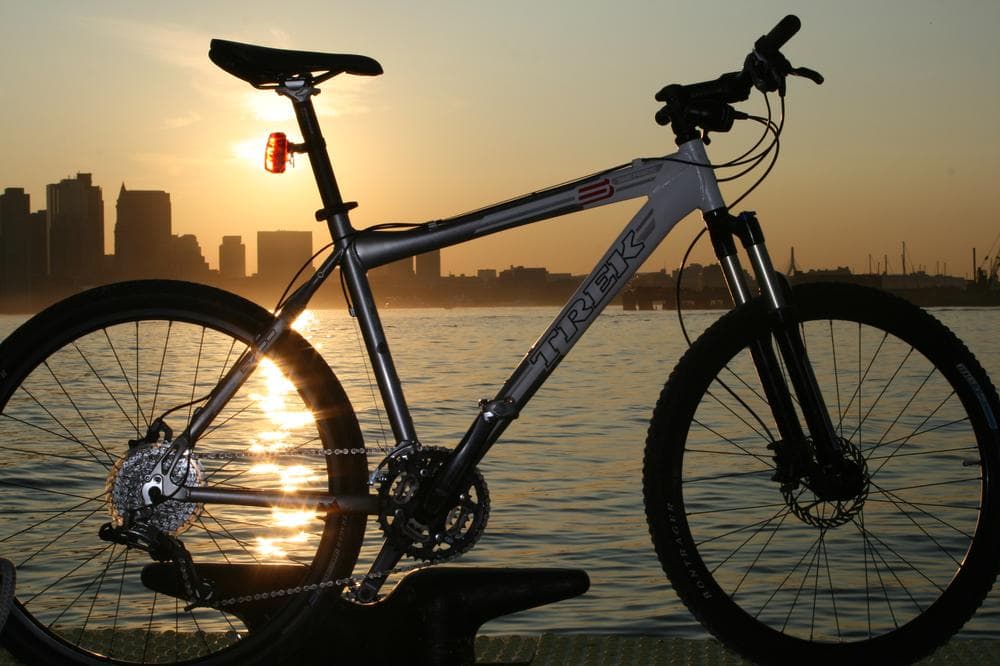Advertisement
Bike Share Program Could Change Boston's Streets
Resume
It's a judgment day of sorts in the city, with Boston's much-talked about new bike-share program, Hubway, scheduled to get up and running Thursday. This is a soft launch, but the city says soon 600 bicycles will be available at some 60 stations around the city.
In the days leading up to the launch, there has been a lot of discussion as to whether Boston — a city with a reputation as more driver-centric than cycle-friendly — is ready for the introduction of hundreds of new riders onto its streets.
Brian McGrory of the Boston Globe, who wrote a column calling for a ban of cyclists on Boston's streets, calls riders "the scourge of the city" and bemoans the new program.
"Riding around downtown Boston or the Kenmore Square area, the BU area, typically going as fast as cars are out there except for they adhere to, from what I can tell, virtually no rules or laws of traffic whatsoever," McGrory said of the typical profile of a city cyclist.
But from the perspective of cyclists, the danger is at least as bad from drivers who refuse to share the road. David Watson, executive director of MassBike, acknowledges that relationship will almost certainly lead to some trouble as the program gets rolling and more bikes are on the road.
"There will undoubtedly be some accidents, but each one will reinforce the message that people need to be more careful and that will I hope very rapidly decrease over time," Watson said.
Of course, it's impossible to really know how the program will pan out until it is up and running. But the closest thing to it right now is probably Urban AdvenTours, a bike rental and tour company based in downtown Boston. We called Parker Musselman, a manager there, for his perspective on how the bike-share might look and how it could affect cycling culture in the city.
He said Boston does have a reputation with tourists and residents as a dangerous place to bike, but Urban AdvenTours has "been dispelling that myth for seven years."
"The people that ride in the bike tours tell us that it wasn't scary at all," he said, "that if they didn't know already that they wouldn't have thought that Boston is a very scary cycling city."
The better "litmus test" for Hubway, though, are the tourists who rent bikes from Urban AdvenTours but then hit the city's streets on their own, without a guide.
"People kind of naturally navigate themselves to areas they feel comfortable," Musselman said. "So if a rider isn't completely comfortable with riding on city streets, like a Boylston Street or something, there are a lot of different ways that they can go to circumnavigate the more scary sections of town. I think Boston does have enough of those for a bunch of new riders out on the streets."
Musselman said there has never been a major accident on one of his company's tours — no "car-on-bike collisions." The typical trouble with drivers is just a matter of attitude. "We've had angry drivers that hang out their window and yell certain things," he said, "but we smile and wave back and try to do everything we can to encourage a good relationship between drivers and bikes."
Musselman is hopeful that the bike-share program will have a significant impact on the bike culture in Boston. While Hubway may take some business away from Urban AdvenTours, he thinks it will ultimately benefit everyone in the cycling community.
"The bigger the pie, the better for the industry," he said.
Plus, "it's a different service," Musselman points out. "Hubway is going to be for a quick sprint from, say, Copley down to the North End. It's more quick transportation, 20 minutes, 30 minutes and under, we're really catering to people that want it for 24, 48 hours or even a week."
Musselman says the program will also be good for local cyclists who are already out on the city's streets, commuting to work every day.
"Be it forced or not, the driving in Boston is going to change with more bikes on the streets," he said. "So it's going to be a sea change in the next five years, I would say, and I think it's going to be for the better as a whole, for drivers and cyclists alike."
More:
This program aired on July 21, 2011.